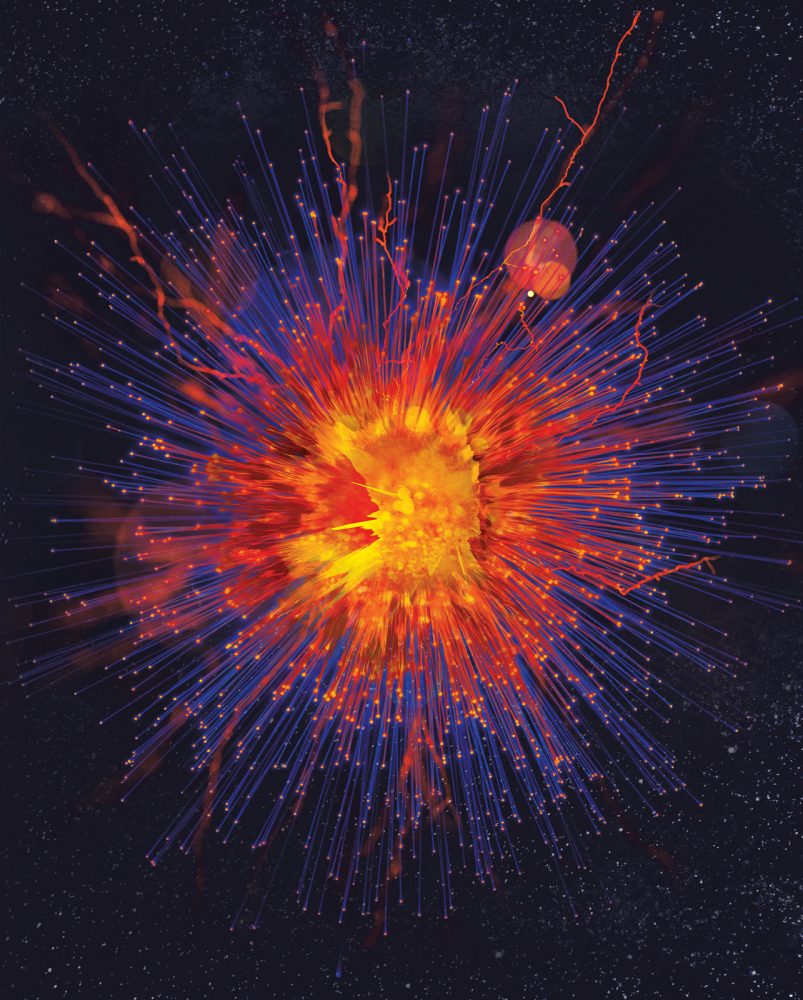


Casey Luskin on Why He Favors ID over Theistic Evolution
Today’s ID the Future continues intelligent design theorist Casey Luskin’s conversation with Apologetics 315 podcast hosts Brian Auten and Chad Gross. Here in Part 2, Luskin give a peek behind the scenes of ID 3.0, the current research program inspired by the intelligent design framework. Luskin is then asked to explain his reservations about theistic evolution, and Luskin points out the evidential, rhetorical, and logical problems he sees with the brand of theistic evolution advocated by Francis Collins and Biologos. What about the future of the intelligent design movement? Luskin says he’s optimistic, both because of the exciting research and publication breakthroughs of late, and because of the many converts he’s seeing to the ID framework. According to Luskin, many of these Read More ›

Günter Bechly: Species Pairs Wreck Darwinism
On this ID the Future, distinguished German paleontologist Günter Bechly continues unpacking his new argument against modern evolutionary theory. According to Bechly, contemporary species pairs diverge hardly at all over millions of years, even when isolated from each other, and yet we’re supposed to believe that the evolutionary process built dramatically distinct body plans in similar time frames at various other times in the history of life. Why believe that? He suggests this pattern of relative stasis among species pairs strikes a significant and damaging blow to Darwinian theory. In this Part 2 episode, Bechly and host Casey Luskin discuss mice/rat pairs, cattle and bison, horses and donkeys, Asian and African elephants, the Asian black bear and the South American Read More ›

Casey Luskin and Adam Shapiro Debate Intelligent Design, Pt. 2
This ID the Future continues the debate between design theorist Casey Luskin, an editor of The Comprehensive Guide to Science and Faith, and science historian Adam Shapiro, co-author of Science and Religion: A Very Short Introduction. Justin Brierley, of the popular British debate program Unbelievable?, hosts. In this second half of the conversation, Shapiro argues that intelligent design’s popularity seems to have waned. Casey Luskin counters, arguing that the number and frequency of New York Times articles on ID is a superficial metric and that the ID research program is exploding, with the number of peer-reviewed ID papers growing every year, and the number of interested graduate students, ID hubs, and conferences expanding around the world, including ID conferences attended by high-level scientists, including Read More ›

Debunked Transitional Fossils Just the Tip of the Iceberg
On today’s ID the Future Casey Luskin hosts distinguished German paleontologist Günter Bechly to discuss Bechly’s essay in the recent Harvest House anthology, The Comprehensive Guide to Science and Faith: Exploring the Ultimate Questions About Life and the Cosmos. Darwinian evolution predicts a gradually branching tree of living forms, with one form shading into another over long periods of evolution, with each transitional step almost too modest to notice. Does the fossil record suggest such a pattern? Quite the opposite, Bechly says. Instead the pattern of the fossil record is consistently one of sudden appearance, and evolutionists have yet to successfully construct a single robustly populated series of gradually transitioning fossils that move chronologically from one form to a distinctly different Read More ›

Stephen Meyer and Skeptic Michael Shermer, Pt. 1
Today’s ID the Future spotlights the first part of a lively and cordial conversation between host and atheist Michael Shermer and Stephen Meyer, author of Return of the God Hypothesis: Three Scientific Discoveries That Reveal the Mind Behind the Universe. In this first of the four-part series, the two touch on everything from Meyer’s three key lines of evidence for theism to a quick flyover of less well-known materialistic origins theories, including the oscillating universe model, panspermia as an explanation for the origin of the first life on earth, and Stephen Hawking’s idea of imaginary time. Meyer lumps many of these ideas under what he terms exotic naturalism and suggests that the atheists who defend these explanations are multiplying exotic Read More ›

An ID Debate, Pt. 2: Joshua Swamidass and Günter Bechly
Today’s ID the Future concludes a debate over the merits of intelligent design and modern evolutionary theory. Günter Bechly is a distinguished German paleoentomologist who was an atheist and Darwinist but became convinced of theism after he finally decided to read some of the books written by leading ID proponents and found their arguments far stronger than he had been led to believe from second-hand accounts. S. Joshua Swamidass is a computational biologist at Washington University in Saint Louis who says ID may or may not be true in some part of what it affirms, but while he believes in a Creator, he doesn’t find the central arguments of intelligent design proponents logical and cogent. He also is more sanguine Read More ›

An ID Debate: Joshua Swamidass and Günter Bechly, Pt. 1
Today’s ID the Future features a debate over the merits of intelligent design. Günter Bechly is a German paleoentomologist heard many times on ID the Future, who says the science convinced him that intelligent design is true. S. Joshua Swamidass is a computational biologist at Washington University in Saint Louis who says ID may or may not be true in some part of what it affirms, but for him, the science doesn’t lead you to it. They met in a dialogue hosted by Justin Brierley on his Unbelievable? podcast, reposted here with Brierley’s permission. This is the first half of the conversation. The second half is coming to IDTF soon.

Intelligent Design: The Canary in the Cancel Culture Coal Mine
On this episode of ID the Future, Rob Crowther speaks with David Klinghoffer, editor of Evolution News and Science Today, about contemporary “cancel culture” that’s attempting to push disfavored ideas and people out of the public square, and how the cancel-culture phenomenon struck intelligent design long before cancel culture was a household term. The term — and the movie title — more commonly used in ID circles has been “expelled.” It’s happened to Richard Sternberg, Günter Bechly, Douglas Axe, and other ID-friendly researchers, to the point that many ID-sympathizing scientists have to hide their beliefs to protect research funding and careers. Klinghoffer emphasizes that this isn’t just a debate off in the corner. Rather, ID is a “hard-core truth,” meaning it’s one of those on Read More ›

Of Natural Selection, Explanatory Deficits, and Bunnies Dark and Light
On this episode of ID the Future we hear the first part of Discovery Institute Education Outreach Associate Daniel Reeves’ talk at the 2020 Dallas Science and Faith Conference. Reeves outlines the meaning of natural selection, and traces its history, starting from Darwin’s early understanding, in the days when cells were viewed as just blobs of protoplasm. Reeves carries the story from there through the neo-Darwinian modern synthesis and into the extended evolutionary synthesis, culminating in a 2016 meeting of the Royal Society on the theory’s continuing — and still unresolved — explanatory deficits.